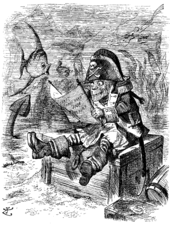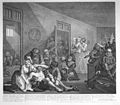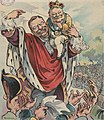The Cartoon Portal

A cartoon is a type of visual art that is typically drawn, frequently animated, in an unrealistic or semi-realistic style. The specific meaning has evolved, but the modern usage usually refers to either: an image or series of images intended for satire, caricature, or humor; or a motion picture that relies on a sequence of illustrations for its animation. Someone who creates cartoons in the first sense is called a cartoonist, and in the second sense they are usually called an animator.
The concept originated in the Middle Ages, and first described a preparatory drawing for a piece of art, such as a painting, fresco, tapestry, or stained glass window. In the 19th century, beginning in Punch magazine in 1843, cartoon came to refer – ironically at first – to humorous artworks in magazines and newspapers. Then it also was used for political cartoons and comic strips. When the medium developed, in the early 20th century, it began to refer to animated films that resembled print cartoons. (Full article...)

In print media, a cartoon is a drawing or series of drawings, usually humorous in intent. This usage dates from 1843, when Punch magazine applied the term to satirical drawings in its pages, particularly sketches by John Leech. The first of these parodied the preparatory cartoons for grand historical frescoes in the then-new Palace of Westminster in London.

Selected article -
The Prince of Egypt is a 1998 American animated musical film and the first traditionally animated film produced and released by DreamWorks Animation. The film is an adaptation of the Book of Exodus and follows the life of Moses and from being prince of Egypt to his ultimate destiny to lead the Hebrew slaves out of Egypt. The film was directed by Brenda Chapman, Simon Wells and Steve Hickner. The film featured songs written by Stephen Schwartz and a score composed by Hans Zimmer. The voice cast featured a number of major Hollywood actors in the speaking roles, while professional singers replaced them for the songs. The exceptions were Michelle Pfeiffer, Ralph Fiennes, Ofra Haza, Steve Martin, and Martin Short, who sang their own parts. The film was nominated for best Original Music Score and won for Best Original Song at the 1999 Academy Awards for "When You Believe". The pop version of the song was performed at the ceremony by Whitney Houston and Mariah Carey. The song, co-written by Stephen Schwartz, Hans Zimmer and with additional production by Babyface, was nominated for Best Original Song (in a Motion Picture) at the 1999 Golden Globes, and was also nominated for Outstanding Performance of a Song for a Feature Film at the ALMA Awards. The film was released in theaters on December 18, 1998, and on home video on September 14, 1999. The film went on to gross $218,613,188 worldwide in theaters, making it the second traditionally animated feature not released by Disney to gross over $100 million in the U.S. after The Rugrats Movie. The film also remained the highest grossing non-Disney traditionally animated film until 2007, when it was out-grossed by The Simpsons Movie.
Selected character -
Superman is a fictional character and one of the most famous and popular comic book superheroes of all time. Created by American writer Jerry Siegel and Canadian artist Joe Shuster in 1932 while both were growing up in Cleveland, Ohio, and sold to Detective Comics Inc. the same year Superman debuted in Action Comics #1 (June 1938), the character has since appeared in radio serials, television programs, films, comic books, newspaper strips and video games, contributing to his long-standing ubiquity. Superman is born Kal-El on an alien planet — later named Krypton — and is rocketed to Earth as an infant by his scientist father moments before the planet's destruction. The rocket lands on Earth, where he is found by passing motorists who adopt him and give him the name Clark Kent. As Clark reaches maturity, he learns he has superhuman abilities which he resolves to use to help others, fighting anything from petty crime to universal threats. After adopting a Kryptonian fabric costume consisting of a blue shirt with a stylized "S" on the chest, a pair of red briefs over blue pants, a pair of red boots, and a red cape, he becomes Earth's champion, with the media giving him several nicknames including "The Man of Steel", "The Man of Tomorrow" and "The Last Son of Krypton". To keep his identity secret when not fighting evil as Superman, Clark lives among humanity as a "mild-mannered" reporter for the Metropolis newspaper The Daily Star (later changed to the Daily Planet). Clark works alongside reporter Lois Lane, with whom he is romantically involved (and married in the mainstream current comics' continuity).
Did you know... -
- ...that the film Green Lantern starring Ryan Reynolds has been in development since the 1990s and once included a comedic incarnation with Jack Black set to star?
- ...that the Fire Nation, from the Universe of Avatar: The Last Airbender, was inspired by photos of volcanic islands of Iceland and the Pacific Ocean?
- ...that Uri-On, created by Michael Netzer in 1987, was the first Israeli superhero to be published in color?
- ...that Banya: The Explosive Delivery Man is a Korean action comic that combines the styles of Mad Max, Dune and The Lord of the Rings?
Selected list -
The episodes of The Bellflower Bunnies, a children's animated series based on the Beechwood Bunny Tales books by Geneviève Huriet, Amélie Sarn and Loïc Jouannigot. It debuted on TF1, a French television network, on 24 December 2001. The series is written by Valérie Baranski, and produced by Patricia Robert. The show centres on the adventures and exploits of the Bellflower family, a clan of seven rabbits who live in Beechwood Grove. The two adults in the family, Papa Bramble and Aunt Zinnia, take care of their five children: Periwinkle, Poppy, Mistletoe, Dandelion and Violette. The series has also been broadcast on CBC Television and TFO in Canada, KI.KA in Germany, Portugal's RTP in the Azores, and in several other countries. The show has fifty-two episodes: four in the first season, twenty-two in the second, and twenty-six in the third. In the entire series, thirteen are based directly on installments in Beechwood Bunny Tales, published by Milan Presse of France and Gareth Stevens in the United States; the rest are based on scripts by Valérie Baranski. Distributors in Europe, North America, and South Korea have released DVDs of the first two seasons.
General images -
Selected biography -
Walter Elias "Walt" Disney (December 5, 1901 – December 15, 1966) was an American film producer, director, screenwriter, voice actor, animator, entrepreneur, entertainer, international icon and philanthropist. Disney is famous for his influence in the field of entertainment during the 20th century. As the co-founder (with his brother Roy O. Disney) of Walt Disney Productions, Disney became one of the best-known motion picture producers in the world. The corporation he co-founded, now known as The Walt Disney Company, today has annual revenues of approximately U.S. $35 billion. Disney is particularly noted for being a film producer and a popular showman, as well as an innovator in animation and theme park design. He and his staff created a number of the world's most famous fictional characters including Mickey Mouse, a character for which Disney himself was the original voice. He has won 26 Academy Awards out of 59 nominations, including a record four in one year, giving him more awards and nominations than any other individual. He also won seven Emmy Awards. He is the namesake for Disneyland and Walt Disney World Resort theme parks in the United States, as well as the international resorts in Japan, France, and China. Disney died of lung cancer in Burbank, California, on December 15, 1966.
Subcategories
WikiProjects
- Main projects
- Arts • Animation • Comics • Entertainment • Visual arts
- Related Projects
- Anime and manga • Biography • Film • Fictional characters • Media franchises • Music • Television • Video games
Selected quote -
Topics
- Comic book
- Comic strip
- Digital comics
- Graphic novel
- Mobile comic
- Motion comics
- Trade paperback
- Webcomic
- Animator
- Animation director
- Animation studios
- Animation film festivals
- Feature-length films
- Short films
- Television series
- Computer-animated films
- Stop-motion films
- Traditional animation
- Limited animation
- Rotoscoping
- Stop Motion
- Clay
- Cutout
- Graphic
- Model
- Object
- Pixilation
- Puppetoon
- Computer animation
- Flash animation
- PowerPoint animation
- SVG animation
- Cel-shaded animation
- Crowd simulation
- Morph target animation
- Motion capture
- Non-photorealistic rendering
- Skeletal animation
Things you can do

- Requested articles: Fenwick (comics), Khimaera (comics), Mutant Underground Support Engine, Bruce J. Hawker, Marc Dacier, Hultrasson, Frankenstein Comics, Dave Johnson (comics), Paco Medina, Dappere Dodo, New Adventures of the Space Explorers, Habatales, Musical Box, Foo-Foo (TV series), Bonne nuit les petits, The Adventures of Lariat Sam, More...
- Images and photos needed: Request images that are needed from Wikipedia requested images of comics and animation to included in each articles.
- Stubs: Work on stubs in articles in Comics and Animation stubs.
- Infobox: Add infobox that are needed from Category:Comics articles without infoboxes and Category:Animation articles needing infoboxes in articles.
- Deletion sorting: Please see the collection of discussions on the deletion of articles related to comics and animation - compiled by WikiProject Deletion sorting
Related portals
Associated Wikimedia
The following Wikimedia Foundation sister projects provide more on this subject:
- Commons
Free media repository - Wikibooks
Free textbooks and manuals - Wikidata
Free knowledge base - Wikinews
Free-content news - Wikiquote
Collection of quotations - Wikisource
Free-content library - Wikiversity
Free learning tools - Wiktionary
Dictionary and thesaurus







































